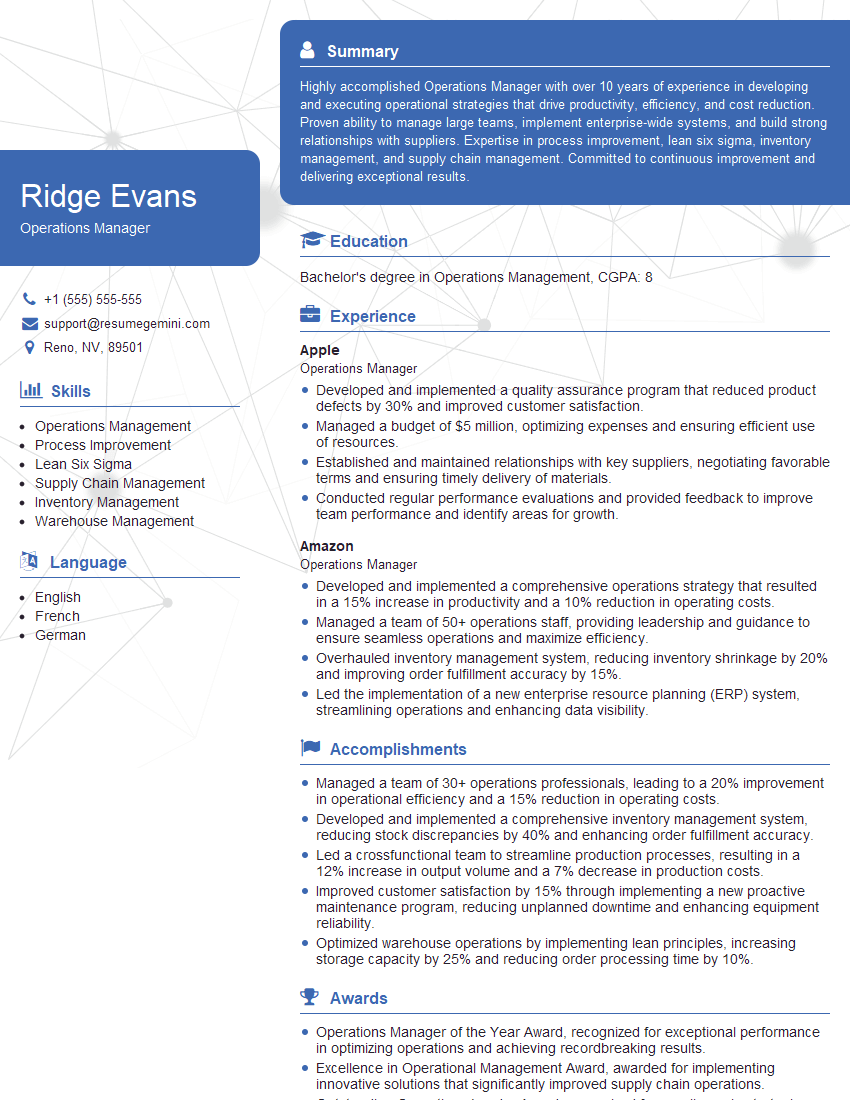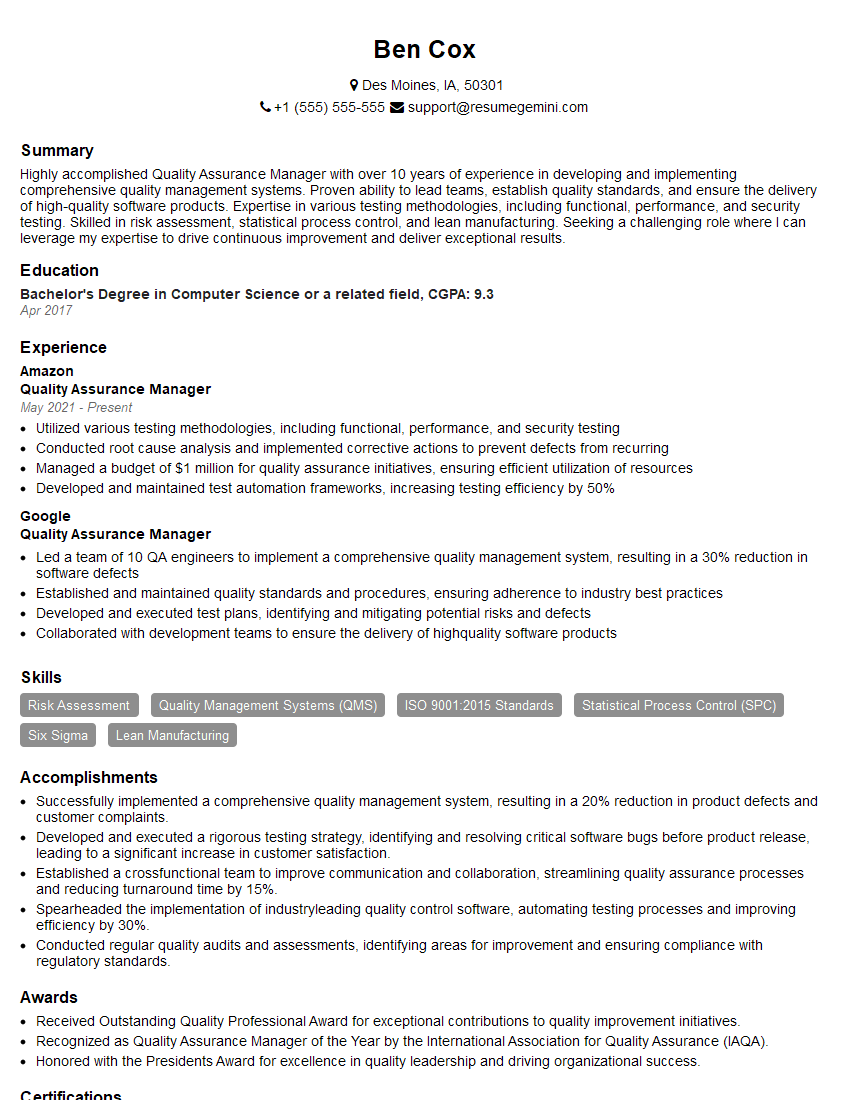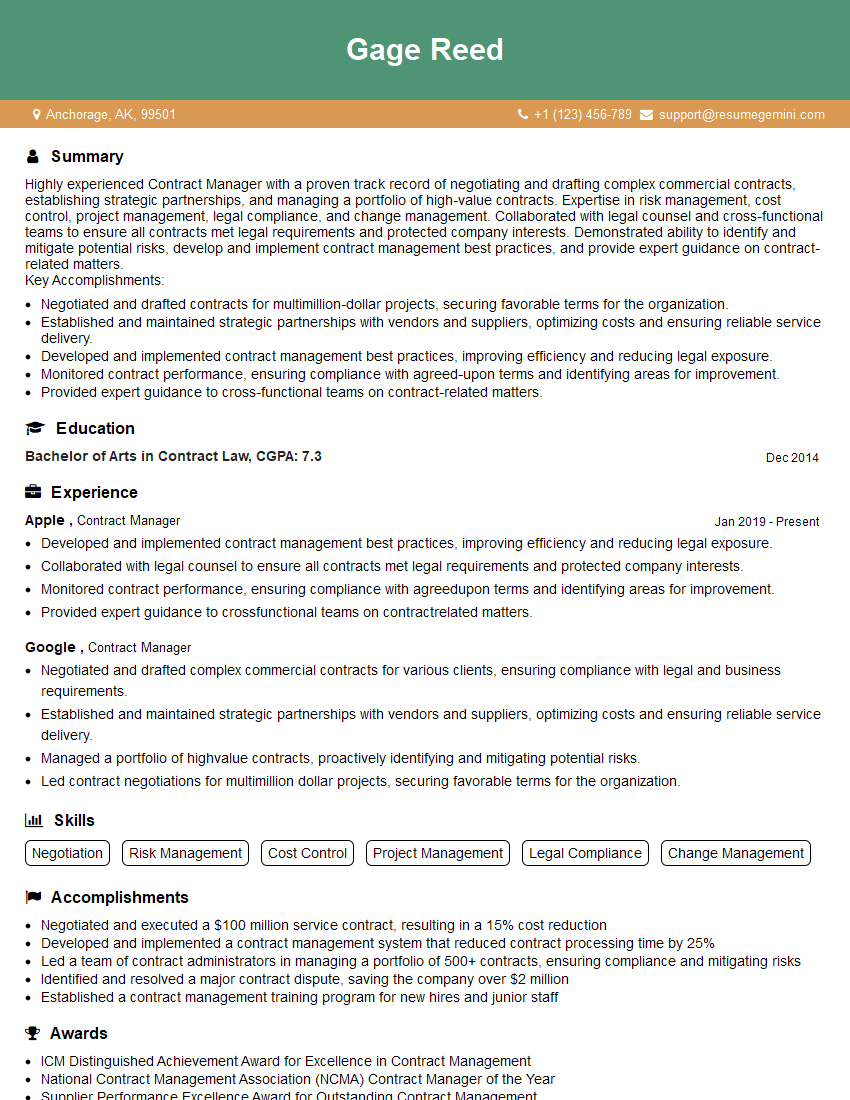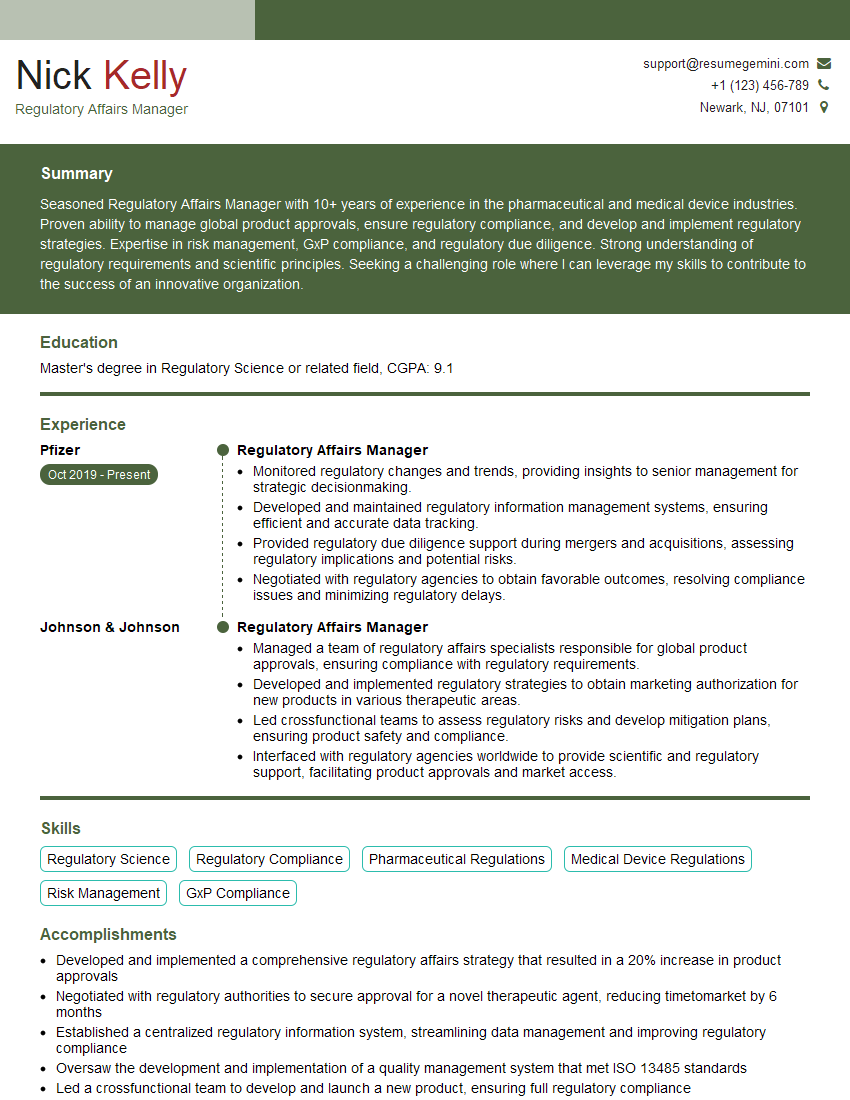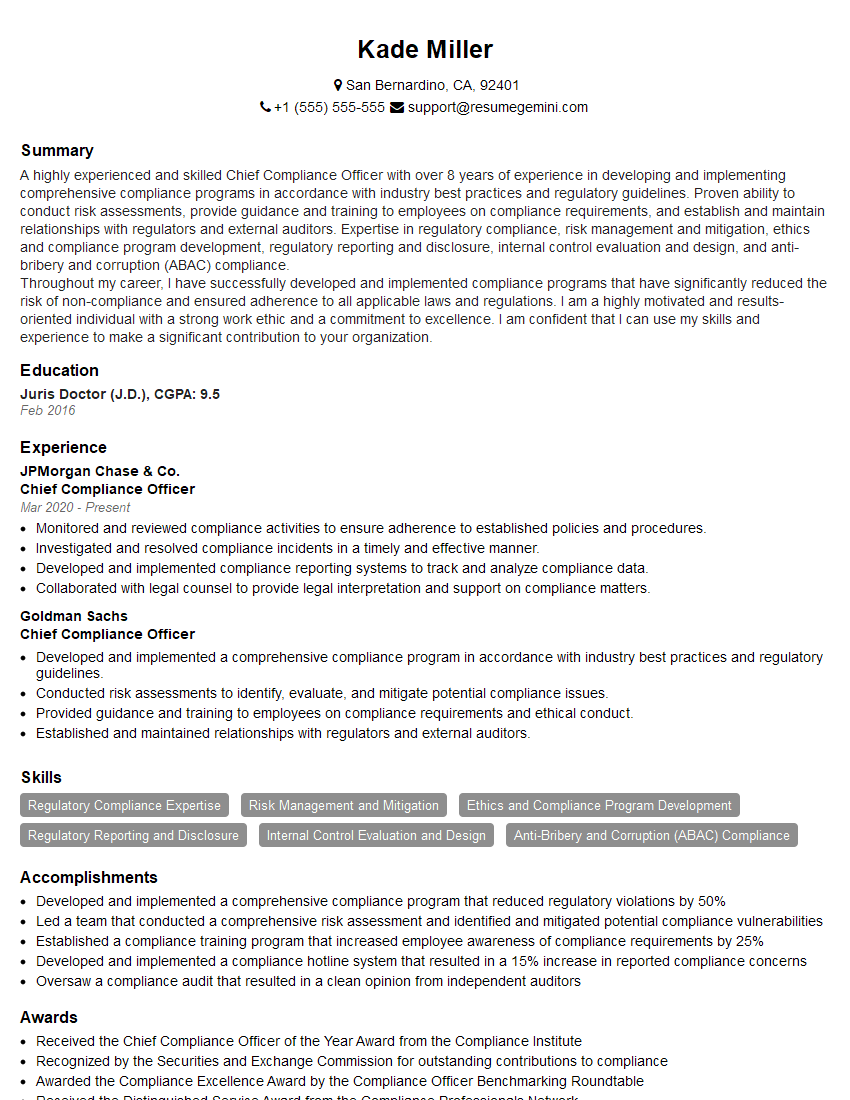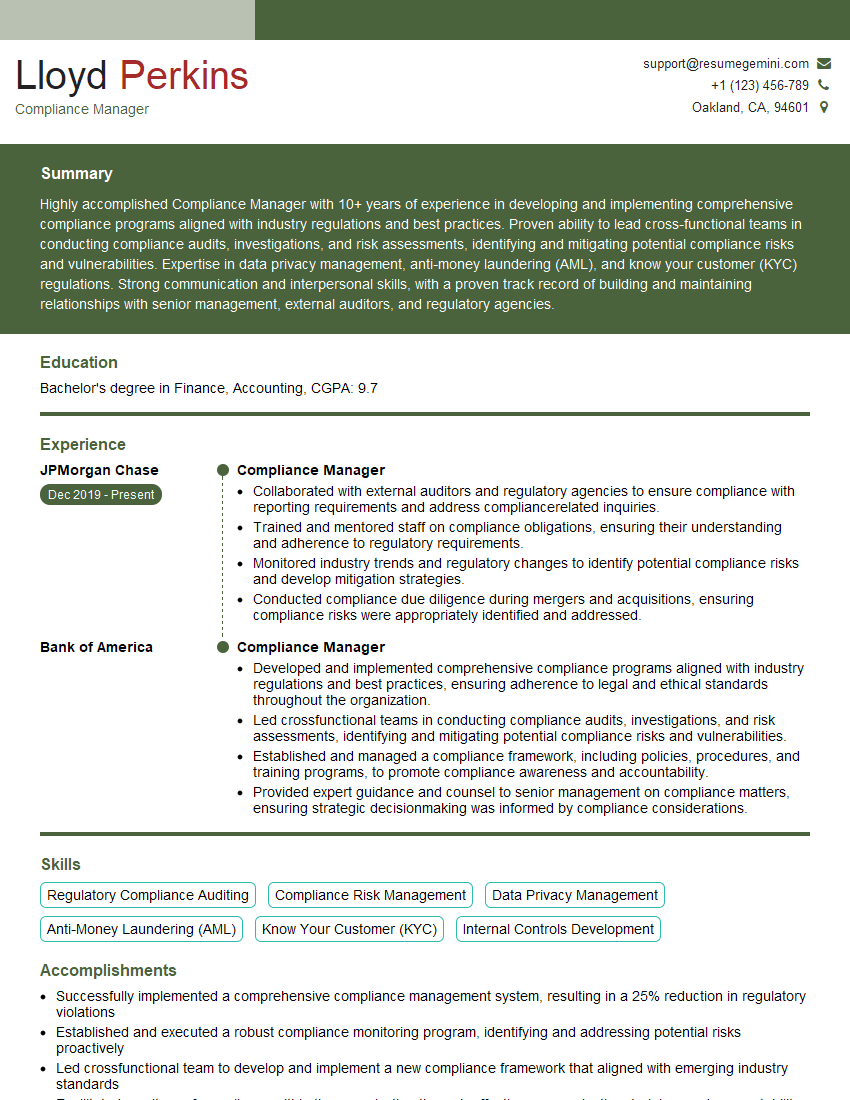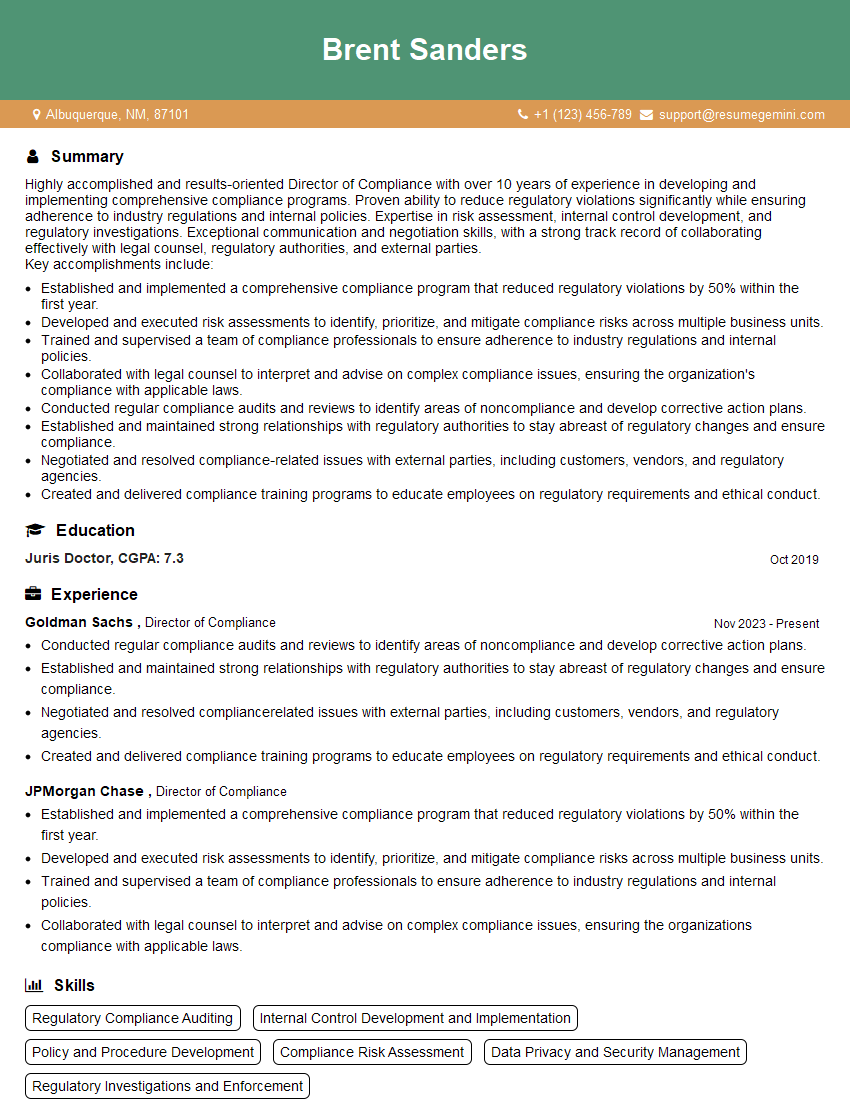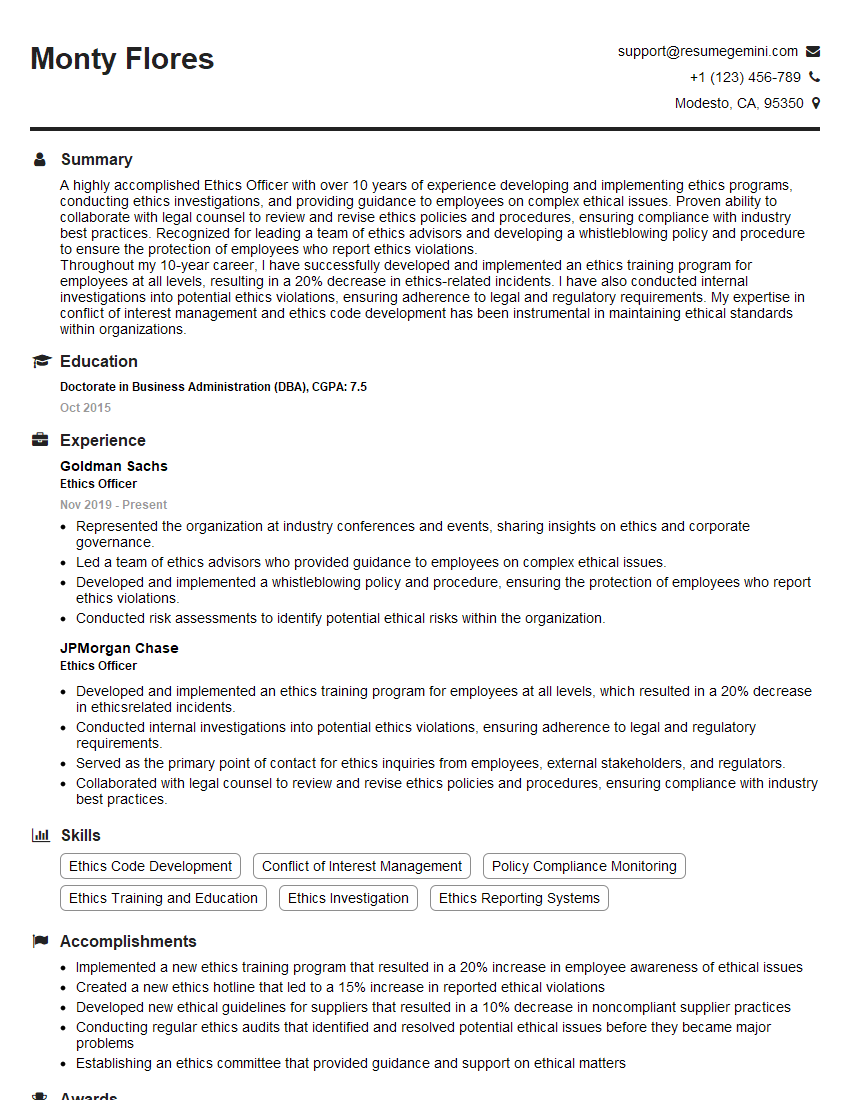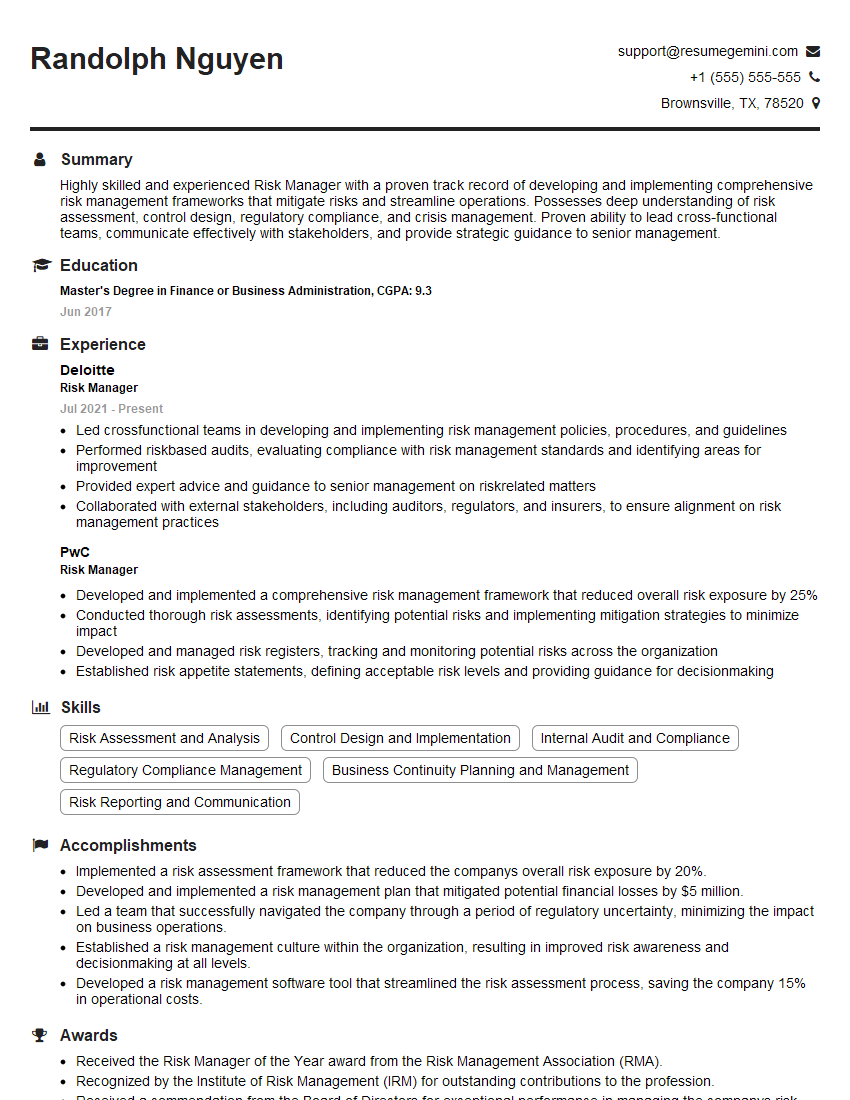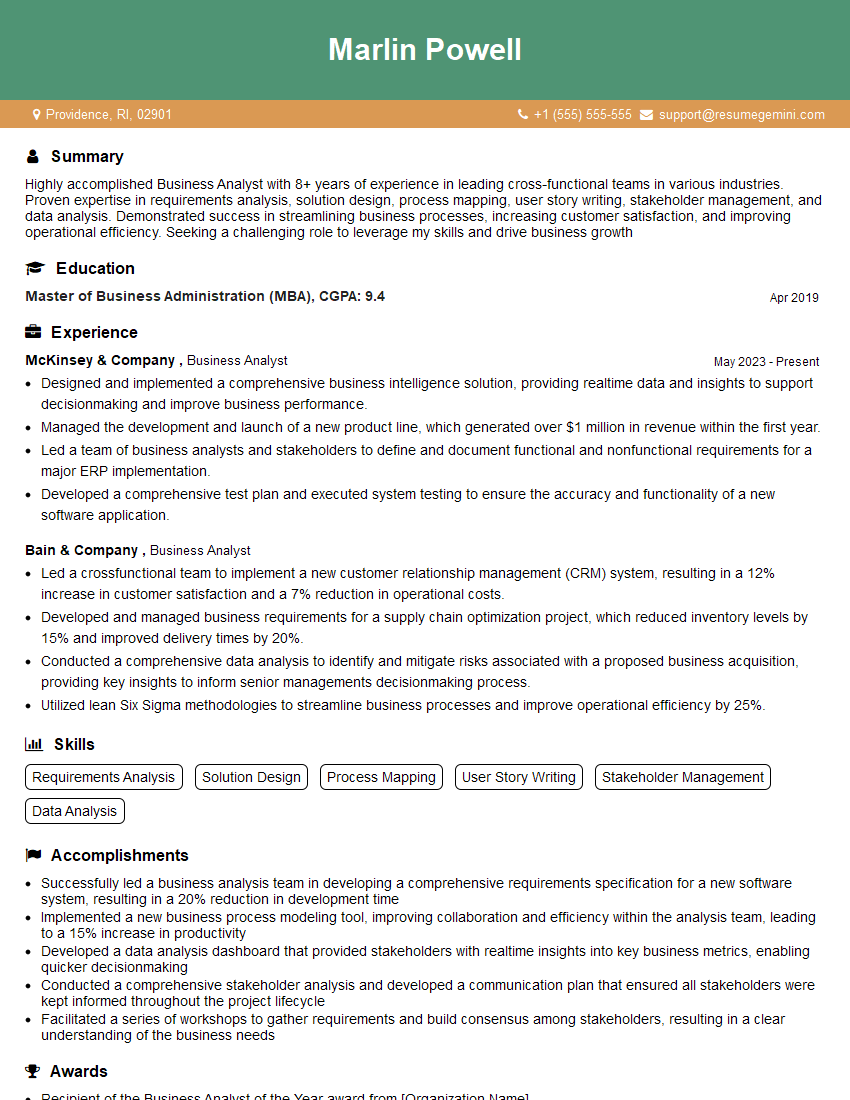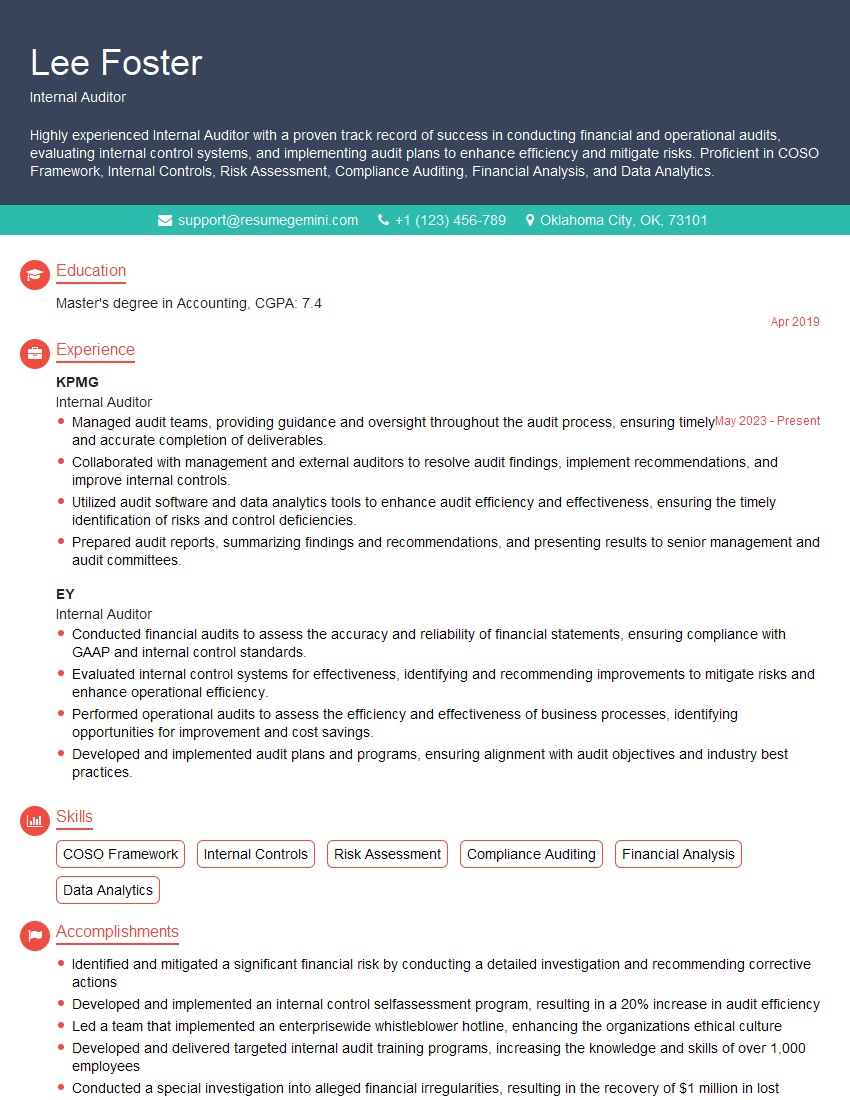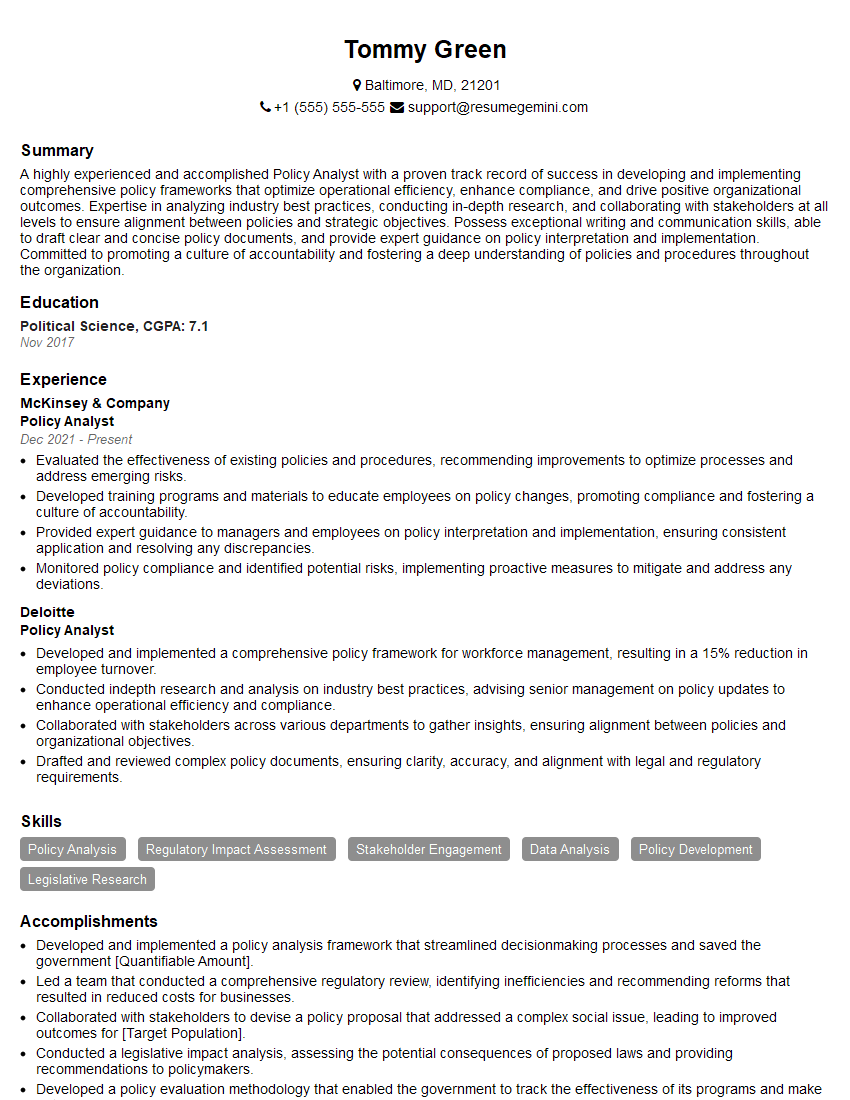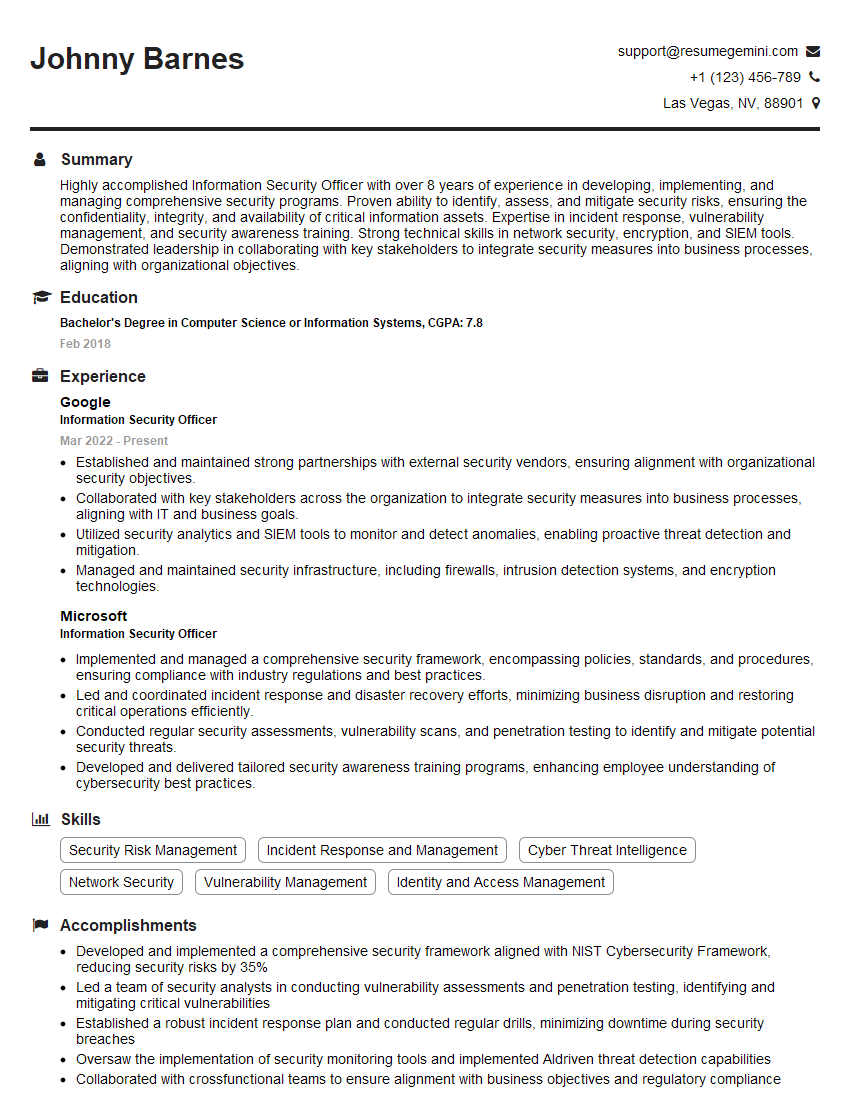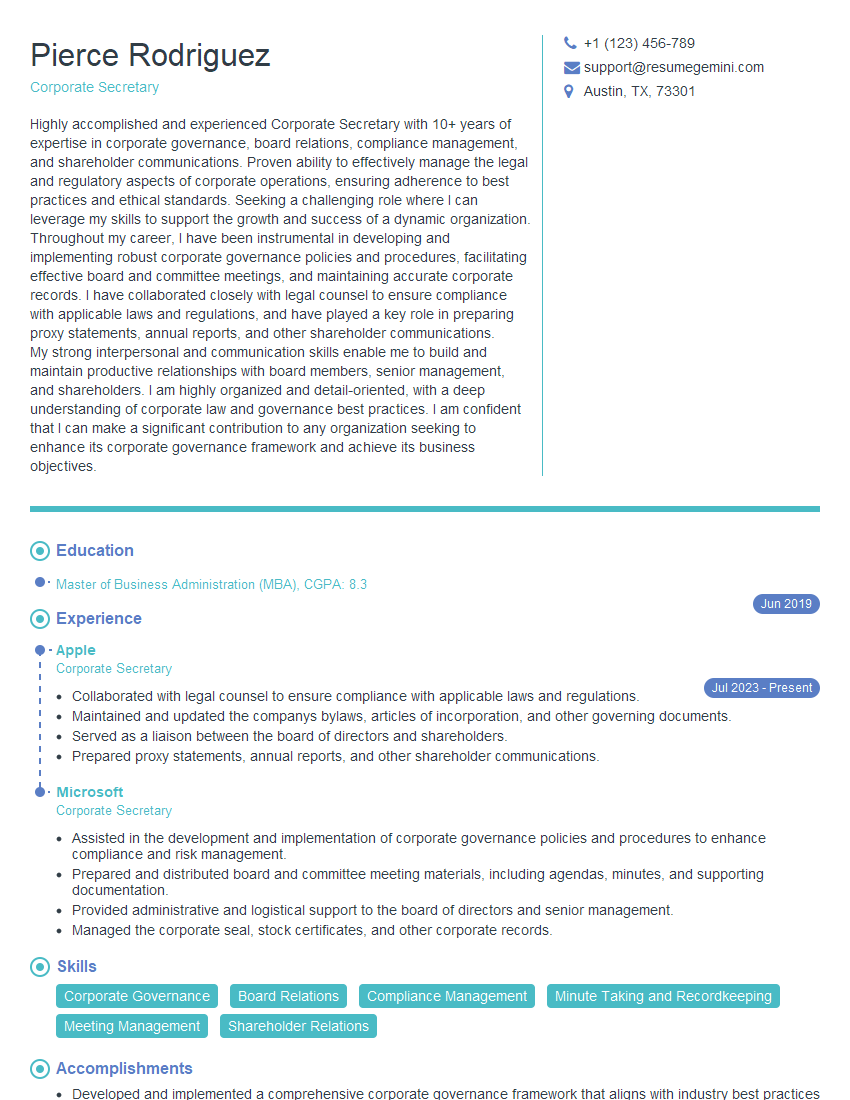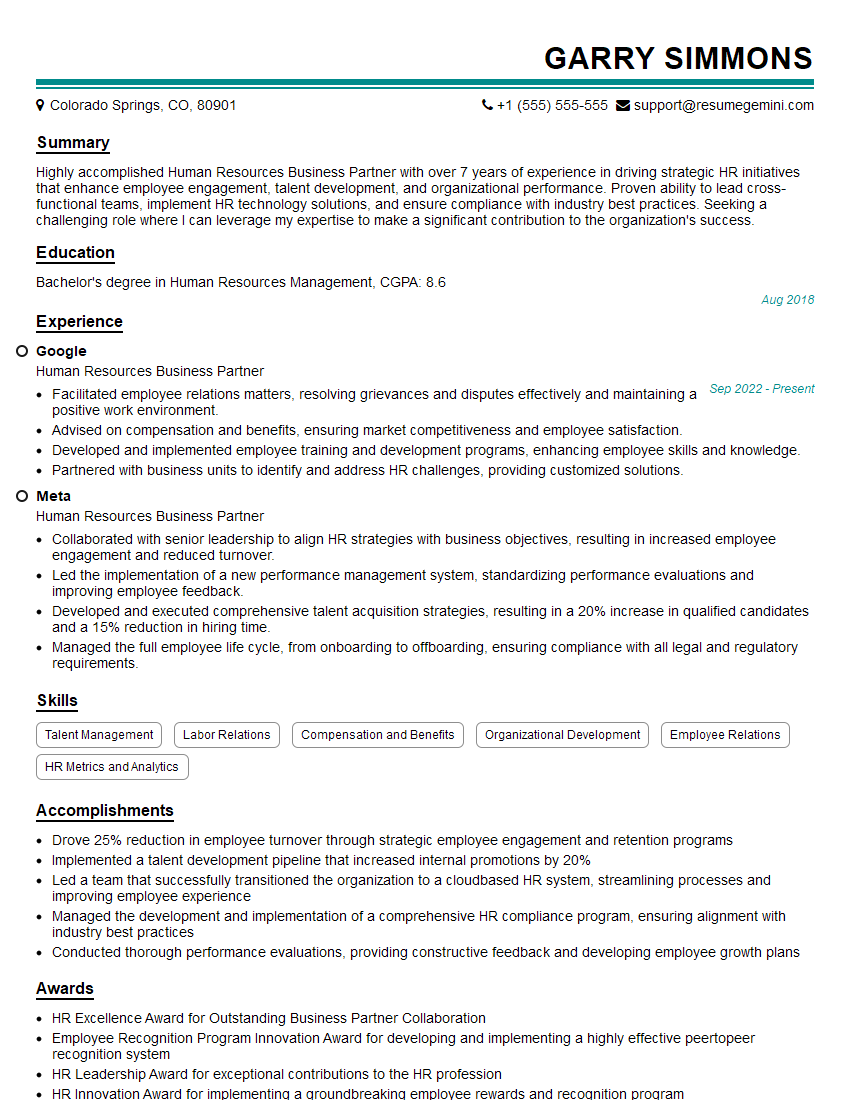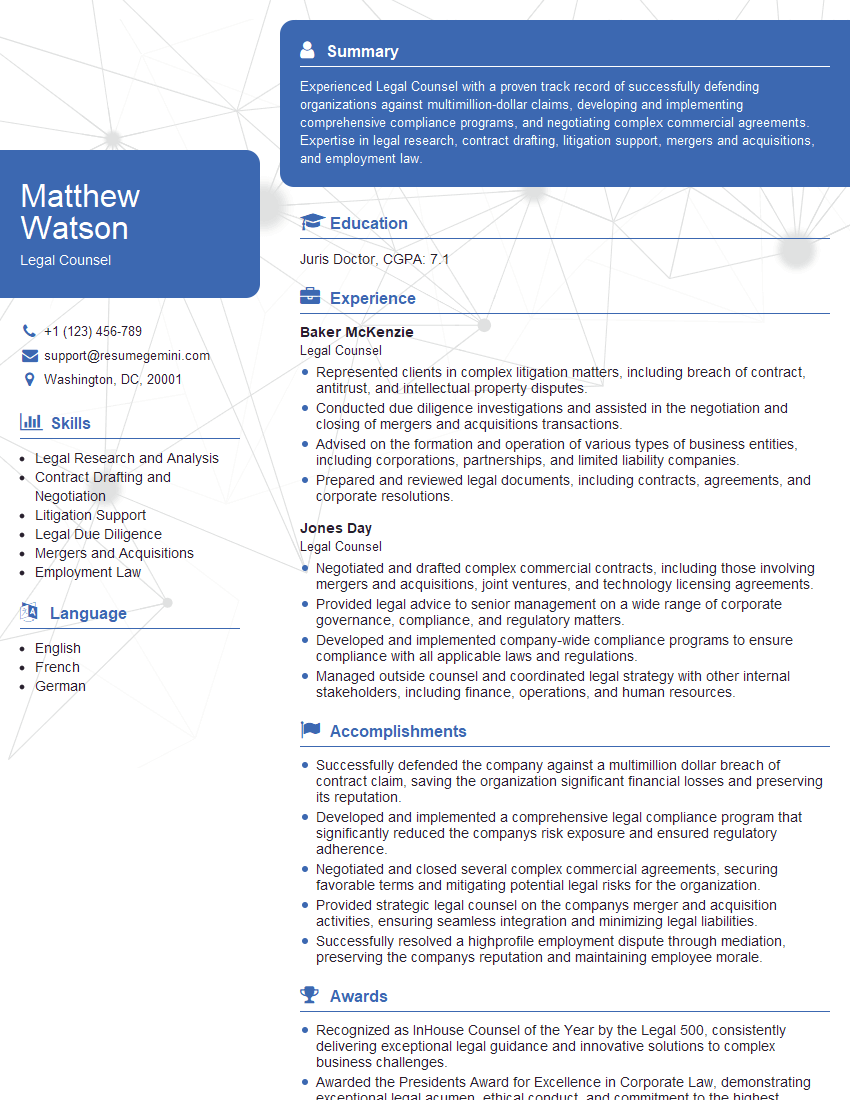Unlock your full potential by mastering the most common Knowledge of Company Policies interview questions. This blog offers a deep dive into the critical topics, ensuring you’re not only prepared to answer but to excel. With these insights, you’ll approach your interview with clarity and confidence.
Questions Asked in Knowledge of Company Policies Interview
Q 1. Explain the company’s policy on expense reimbursement.
Our company’s expense reimbursement policy ensures fair and transparent compensation for business-related expenses. To be reimbursed, expenses must be directly related to company business, pre-approved (where necessary), and properly documented.
The process involves submitting a detailed expense report, including original receipts, within 30 days of the expense. The report should clearly state the purpose of the expense and its connection to company work. For example, a trip to a client meeting would require documentation such as flight tickets, hotel bills, and meeting agenda. Meals are generally reimbursed up to a certain per diem rate. Expenses exceeding a certain threshold often require additional approval from a manager. We use a dedicated expense management software to streamline this process and ensure compliance.
Unreimbursed expenses will be addressed on a case-by-case basis, and a reason for denial will be clearly communicated.
Q 2. Describe the process for reporting a workplace violation.
Reporting a workplace violation is crucial for maintaining a safe and respectful work environment. We encourage open and honest communication. Our policy prioritizes confidentiality and support for the reporting individual.
- Step 1: Identify the violation. This could range from harassment and discrimination to safety hazards or ethical breaches.
- Step 2: Gather evidence. If possible, document the incident with dates, times, witnesses, and any relevant communication.
- Step 3: Report the violation. You can report to your manager, HR department, or a designated ethics hotline, depending on the severity and nature of the violation.
- Step 4: Follow up. After reporting, follow up with the relevant department to ensure your report is being addressed and that appropriate action is taken.
We have a zero-tolerance policy for retaliation against individuals who report violations. We understand that reporting can be challenging, and we’re committed to providing support throughout the process.
Q 3. What is the company’s policy on social media usage?
Our social media policy aims to protect our company’s reputation and ensure employee safety. While we encourage employees to engage in online communities, it’s crucial to maintain professionalism and confidentiality.
The policy highlights the importance of refraining from posting confidential company information, disparaging remarks about colleagues or the company, and engaging in activities that could damage our brand. Employees are expected to represent the company professionally in their online interactions. For example, sharing internal company documents, project details, or client information on social media is strictly prohibited. Similarily, using company logos or branding without approval is also a violation.
We advise employees to be mindful of their online presence and to avoid posting anything they wouldn’t want their manager or clients to see.
Q 4. How does the company’s policy on data privacy protect sensitive information?
Data privacy is a top priority. Our policy aligns with relevant regulations like GDPR and CCPA to protect sensitive information. We employ a multi-layered approach.
- Data Minimization: We only collect the necessary data for specific business purposes.
- Access Control: Strict access controls ensure that only authorized personnel can access sensitive data. This is implemented via role-based access and multi-factor authentication.
- Data Encryption: Data is encrypted both in transit and at rest to protect it from unauthorized access.
- Regular Security Audits: We conduct regular security audits and vulnerability assessments to identify and address potential weaknesses.
- Incident Response Plan: We have a comprehensive incident response plan to handle data breaches and minimize their impact.
Employees receive regular training on data privacy best practices, emphasizing the importance of safeguarding confidential information.
Q 5. Outline the steps involved in requesting a leave of absence.
Requesting a leave of absence requires adhering to a formal process to ensure proper documentation and approvals. The specific requirements may vary depending on the type and duration of the leave (e.g., sick leave, vacation, family leave).
- Step 1: Submit a formal request. This typically involves completing a leave request form, providing the dates of the leave and a brief explanation of the reason (if necessary and appropriate).
- Step 2: Provide supporting documentation. Depending on the type of leave, you may need to provide supporting medical documentation or other relevant paperwork.
- Step 3: Obtain approval. Your request will be reviewed by your manager and HR department. You’ll receive notification of approval or any required adjustments.
- Step 4: Follow up. After your leave, ensure you communicate your return to work.
It is important to submit your request well in advance to allow ample time for processing and approval.
Q 6. Explain the company’s policy on intellectual property.
Our intellectual property (IP) policy safeguards our company’s valuable assets, including inventions, trademarks, copyrights, and trade secrets. It outlines the responsibilities of employees in protecting and using company IP.
Employees are prohibited from disclosing or using company IP for personal gain or for the benefit of competitors. All inventions developed during employment are considered company property. Proper usage of copyrighted materials and adherence to trademark guidelines are essential. We regularly provide training to educate employees about IP rights and responsibilities. Any suspected IP violation is investigated thoroughly.
Think of it like this: Our IP is the foundation of our innovation and competitive advantage. Protecting it is crucial for our continued success.
Q 7. What are the consequences of violating company policy?
Violating company policy can result in various consequences, depending on the severity and nature of the violation and whether it’s a first offense or a repeat occurrence. Consequences range from:
- Verbal warnings: For minor infractions.
- Written warnings: For more serious or repeated offenses.
- Suspension: Temporary removal from work, usually without pay.
- Termination of employment: For serious violations, such as gross misconduct or theft.
- Legal action: In cases involving significant legal liabilities.
The severity of the consequence is determined on a case-by-case basis and aligns with our principles of fairness and consistency.
Q 8. How does the company handle conflicts of interest?
Our company takes conflicts of interest very seriously. A conflict of interest arises when an employee’s personal interests, or those of a close family member, could potentially compromise their objectivity or impartiality in carrying out their duties. This could involve financial interests, personal relationships, or outside business ventures.
Our policy requires employees to disclose any potential conflicts of interest to their supervisor. This disclosure allows us to assess the situation and implement appropriate measures, which might include recusal from specific projects, additional oversight, or changes in responsibilities. We have a dedicated ethics hotline for anonymous reporting and a detailed procedure to investigate any reported conflicts, ensuring a fair and impartial process.
For example, if a purchasing manager’s spouse owns a company that supplies materials to our organization, that would be a clear conflict of interest. The manager would be required to disclose this relationship and likely be removed from the purchasing process for those materials.
Q 9. Describe the process for updating or revising company policies.
Updating or revising company policies is a formal process designed to maintain relevance and effectiveness. It begins with identifying the need for a change, perhaps due to new legislation, evolving business practices, or feedback from employees. A designated team, often including legal counsel and representatives from relevant departments, then drafts the proposed changes.
These proposed changes are reviewed internally and, depending on the significance, may require approval from senior management or even the board of directors. Before implementation, the revised policy is typically circulated for review and feedback among impacted employees. This feedback is considered and integrated before the final version is released. Finally, the updated policy is widely distributed and often archived for easy access. We maintain a comprehensive policy library accessible through the company intranet.
Q 10. How are company policies communicated to employees?
Effective communication of company policies is critical to ensuring compliance. We utilize a multi-faceted approach to ensure every employee understands the rules and regulations governing their work.
- Intranet: Our company intranet serves as a central repository for all policies, readily accessible to every employee.
- Email Announcements: Significant policy changes or new policies are announced via company-wide emails, ensuring immediate awareness.
- Training Sessions: Regular training sessions, both in-person and online, are conducted to reinforce policy understanding and answer questions.
- Managerial Communication: Managers are responsible for ensuring their teams understand and comply with relevant policies. Regular team meetings often include policy discussions.
- Policy Acknowledgement Forms: Employees acknowledge their understanding and agreement to comply with company policies by signing forms upon hiring and whenever policies are updated.
Q 11. What resources are available to employees for understanding company policies?
Employees have several resources available to assist them in understanding company policies.
- Company Intranet: A searchable database containing all company policies and related documentation.
- Human Resources Department: The HR department acts as a central point of contact for policy-related questions and provides guidance and interpretations.
- Supervisors and Managers: Employees can seek clarification from their supervisors or managers on any policy-related concerns.
- Ethics Hotline: An anonymous hotline for reporting policy violations or seeking guidance on ethical dilemmas.
- Policy Manuals (Hard Copy): Physical copies are available for employees who prefer offline access.
Q 12. How does the company ensure compliance with its own policies?
Ensuring compliance is an ongoing process, not a one-time event. We employ a variety of methods to monitor and reinforce adherence to our policies.
- Regular Audits: Internal audits are conducted to assess compliance levels and identify areas for improvement.
- Employee Training and Awareness Programs: Continuous training keeps employees updated on policy changes and reinforces best practices.
- Reporting Mechanisms: Multiple channels, such as the ethics hotline and dedicated reporting forms, encourage employees to report violations or concerns.
- Disciplinary Action: Clear disciplinary procedures are in place to address policy violations, ranging from warnings to termination, depending on the severity of the offense.
- Performance Reviews: Policy compliance is often a factor considered during performance appraisals.
Think of it like maintaining a clean house; regular cleaning and inspections are vital to prevent larger problems from developing.
Q 13. What are the key elements of the company’s code of conduct?
Our company’s code of conduct is built upon the principles of integrity, respect, and professionalism. Key elements include:
- Ethical Conduct: Maintaining the highest ethical standards in all business dealings.
- Respectful Workplace: Creating and maintaining a respectful and inclusive work environment for all employees.
- Confidentiality: Protecting confidential information and maintaining client privacy.
- Compliance with Laws and Regulations: Adhering to all applicable laws, regulations, and company policies.
- Professionalism: Conducting oneself professionally both inside and outside of the workplace.
- Conflict of Interest: Disclosing and managing potential conflicts of interest.
- Reporting Violations: Reporting any violations of the code of conduct or company policies.
The code of conduct isn’t just a document; it’s a reflection of our company values and a guide for how we interact with each other and with our stakeholders.
Q 14. Explain the company’s policy regarding workplace harassment.
Our company has a zero-tolerance policy regarding workplace harassment of any kind. This includes but isn’t limited to verbal, physical, or psychological harassment based on factors such as gender, race, religion, sexual orientation, or disability.
Our policy outlines a clear reporting process. Employees are encouraged to report any incidents of harassment immediately to their supervisor, HR department, or through our confidential ethics hotline. All reports are thoroughly investigated, and appropriate disciplinary action, up to and including termination, is taken against those found to have engaged in harassment. We offer various support resources for victims, including counseling and support groups. The goal isn’t just to address the immediate incident, but also to create a safe and supportive environment where everyone feels respected and valued.
We also conduct regular training sessions on identifying and preventing workplace harassment to help employees understand what constitutes harassment and how to report it. This proactive approach aims to prevent incidents from occurring in the first place.
Q 15. How does the company address policy violations?
Our company takes policy violations very seriously. The approach depends on the severity of the violation and whether it’s a first offense or a repeat. A minor infraction, like being late a few times, might result in a verbal warning. More serious breaches, such as misuse of company assets or violating safety regulations, could lead to written warnings, suspension, or even termination, depending on company policy and the applicable legal context.
Our progressive discipline process ensures fairness and allows employees opportunities to correct their behavior. Each case is reviewed by HR and the employee’s manager, and the decision is documented. For instance, an employee consistently failing to meet deadlines might receive coaching and additional training, while someone who breaches confidentiality could face immediate disciplinary action. The goal is to correct behavior while maintaining a fair and consistent approach across the company.
Career Expert Tips:
- Ace those interviews! Prepare effectively by reviewing the Top 50 Most Common Interview Questions on ResumeGemini.
- Navigate your job search with confidence! Explore a wide range of Career Tips on ResumeGemini. Learn about common challenges and recommendations to overcome them.
- Craft the perfect resume! Master the Art of Resume Writing with ResumeGemini’s guide. Showcase your unique qualifications and achievements effectively.
- Don’t miss out on holiday savings! Build your dream resume with ResumeGemini’s ATS optimized templates.
Q 16. Explain the difference between company policy and legal regulations.
Company policies and legal regulations are related but distinct. Legal regulations are laws and rules established by government bodies that all organizations must comply with. They set minimum standards for behavior and operation. Company policies, on the other hand, are internal rules created by a company to guide employee behavior, define processes, and ensure consistent operations. They can go beyond legal requirements to set higher standards or address issues not covered by law.
Think of it like this: legal regulations are the floor, defining the absolute minimum acceptable behavior. Company policies are often the ceiling, aiming for best practices and setting internal expectations above and beyond the legal mandates. For example, the law might require you to pay minimum wage, but your company policy might offer a significantly higher salary based on experience and skills.
Q 17. How does the company ensure policies are consistent with legal requirements?
Ensuring alignment between company policies and legal requirements is a crucial part of our risk management strategy. We have a dedicated legal and compliance team that regularly reviews all policies to ensure they are current with all relevant laws and regulations. This includes tracking changes in legislation, such as updates to employment law, data protection, or health and safety standards.
Our policy review process involves legal counsel, HR, and representatives from different departments to ensure a comprehensive understanding of both the legal landscape and the practical implications for the company. Any necessary updates are then implemented through a formal process, including communication to all employees. We conduct regular training sessions to ensure employees understand these policies and their importance.
Q 18. Describe the company’s policy on employee safety.
Employee safety is paramount. Our policy encompasses a multifaceted approach. This includes providing a safe working environment, complying with all relevant occupational health and safety regulations, and providing necessary safety training and equipment. We conduct regular safety inspections, investigate accidents thoroughly, and encourage employees to report any hazards or concerns immediately.
Examples of our safety initiatives include providing personal protective equipment (PPE), conducting regular safety training sessions, and offering ergonomic assessments to prevent workplace injuries. We also have clear procedures for handling workplace accidents and emergencies, including emergency response plans and first aid provisions. Our policy prioritizes proactive measures to prevent accidents and injuries rather than just reacting to incidents.
Q 19. What is the company’s policy on equal opportunities and diversity?
Our commitment to equal opportunities and diversity is enshrined in our core values. Our policy prohibits discrimination and harassment based on factors such as race, religion, gender, sexual orientation, age, disability, or any other protected characteristic. We strive to create a workplace that is inclusive and values the contributions of all employees.
This policy includes commitments to fair recruitment practices, equal pay for equal work, and career development opportunities for all employees regardless of background. We actively seek diverse candidates for all roles and encourage employee resource groups that promote inclusion and understanding. Regular training sessions on diversity and inclusion are provided to all employees to reinforce our commitment and ensure a welcoming environment for everyone.
Q 20. How does the company handle employee grievances related to company policy?
We have a robust grievance procedure to address employee concerns related to company policy. Employees can submit a grievance formally, either verbally or in writing, to their immediate manager or to HR. The grievance is then investigated promptly and confidentially. The employee will be kept informed of the progress and the outcome of the investigation.
The process involves a series of steps, including mediation if possible and escalation to higher management if necessary. Our aim is to resolve grievances fairly and efficiently, ensuring a supportive and respectful workplace. The entire process is documented, and employee feedback is considered for potential policy improvements.
Q 21. Explain the process for reporting a security incident.
Reporting a security incident is crucial for protecting our company and our data. Our policy encourages immediate reporting of any suspicious activity or potential breach. Employees can report incidents through several channels, including a dedicated security hotline, email to the security team, or by contacting their immediate supervisor.
The reporting process follows a clear protocol. The incident is logged and investigated, and any necessary remedial action is taken promptly. The process includes containing the breach, investigating its cause and extent, and implementing measures to prevent similar incidents in the future. Regular security awareness training reinforces the importance of timely reporting and outlines the steps involved in the process.
Q 22. What is the company’s policy on the use of company equipment?
Our company policy on the use of company equipment prioritizes security, productivity, and responsible use. All equipment, including computers, phones, software, and peripherals, remains the property of the company.
Employees are expected to use company equipment solely for business purposes. Personal use is strictly limited and should only be for brief, incidental tasks, such as checking a quick email from a family member. Downloading or installing unauthorized software is absolutely prohibited.
We provide clear guidelines on acceptable use, including data security protocols. Failure to adhere to these policies can result in disciplinary action, up to and including termination. For instance, using company equipment to access inappropriate websites or engage in illegal activities is a serious breach of policy. We also have robust security measures in place, such as regular software updates and network monitoring, to protect our systems.
Q 23. How does the company’s policy on performance management work?
Our performance management system is designed to be collaborative and focused on growth. It’s a continuous process, not a single annual event. We use a combination of regular check-ins, formal performance reviews, and ongoing feedback to track progress towards individual goals and overall company objectives.
The process begins with setting clear, measurable, achievable, relevant, and time-bound (SMART) goals. Regular check-ins with your manager provide opportunities for open communication, addressing challenges, and celebrating successes. Formal performance reviews take place annually, providing a structured opportunity for more in-depth evaluation and planning for the next performance cycle. We offer various training and development opportunities to support employee growth and address any performance gaps identified.
Performance evaluations are based on objective criteria, including work quality, meeting deadlines, contributions to team goals, and adherence to company policies. A transparent rating scale is used, and feedback is always provided constructively with a focus on improvement. This system ensures that we acknowledge high performance and support employees in developing their skills.
Q 24. Describe the company’s policy regarding travel and expenses.
Our travel and expense policy aims to ensure efficient and cost-effective business travel while maintaining a safe and compliant approach. All business travel must be pre-approved by your manager and follow the guidelines outlined in the company’s travel policy document.
Employees are required to book travel through designated channels to take advantage of negotiated corporate rates for flights and accommodations. Detailed expense reports must be submitted promptly, including original receipts for all expenses. Acceptable expenses typically include airfare, lodging, ground transportation, meals (within reasonable limits), and other directly business-related costs. Personal expenses are not reimbursed. The company has a clear process for reviewing and approving expense reports, and any discrepancies will be investigated and addressed.
For example, if an employee is traveling internationally, they would need to submit a detailed itinerary well in advance, and the company will provide guidance on things like visa requirements and necessary vaccinations.
Q 25. Explain the process for obtaining authorization to work outside normal business hours.
Working outside normal business hours requires prior authorization to ensure appropriate coverage and maintain operational efficiency. Requests should be submitted to your manager at least 24 hours in advance, outlining the reason for working outside regular hours, the expected duration, and any potential impact on other team members.
Your manager will assess the request considering factors such as project deadlines, team workload, and the overall operational needs of the department. Approval will be granted if the work is essential and aligns with company objectives. If the nature of the work necessitates accessing company systems remotely, appropriate security measures must be in place to comply with our information security policies. For example, a project nearing a critical deadline might require approval to work late to meet a contractual commitment, or an on-call emergency situation may require immediate authorization.
Unapproved work outside of normal business hours is not permitted. Employees are expected to maintain a healthy work-life balance and should not be pressured into undertaking excessive overtime without proper authorization and compensation where applicable.
Q 26. How does the company’s policy on environmental sustainability impact daily operations?
Our commitment to environmental sustainability is woven into our daily operations through various initiatives. We aim to minimize our environmental footprint by reducing waste, conserving energy, and promoting responsible resource management.
This translates into practical actions such as promoting the use of digital documents instead of paper, implementing recycling programs, encouraging the use of public transport or carpooling for business travel, and ensuring energy-efficient equipment and practices in our offices. We also regularly assess our environmental impact and identify areas for improvement. For instance, we actively track our energy consumption and aim to achieve continuous reduction through better facility management.
Our sustainable practices are not just an initiative, but a core value reflected in our procurement policies and our employee engagement programs, encouraging responsible behaviour in our daily routines.
Q 27. How are company policies regularly reviewed and updated?
Regular review and updates of company policies are crucial to maintain relevance and compliance. Our policies are reviewed and updated at least annually or whenever significant changes in legislation, technology, or business practices necessitate it.
This process involves a multi-stage approach. First, relevant departments identify areas needing revision or new policies. This could be in response to feedback from employees, changes in regulations, or evolving business needs. Next, a dedicated team drafts proposed changes, considering legal and ethical implications, employee input, and best practices in the industry. After internal review and legal counsel approval, the updated policies are disseminated to all employees through company-wide communications, training, and clear documentation. This systematic approach ensures that our policies remain current, fair, and effective.
Q 28. What is the company’s policy on whistleblowing?
Our whistleblowing policy protects employees who report suspected violations of law, company policy, or ethical concerns. We encourage reporting of such matters through several channels, ensuring confidentiality and protection from retaliation.
Employees can report concerns anonymously through a confidential hotline, dedicated email address, or directly to their manager or designated ethics officer. The reported matter will be investigated thoroughly and impartially, with appropriate action taken based on the findings. The company is committed to creating a culture of integrity and accountability, and whistleblowing plays a crucial role in upholding these values. We guarantee that there will be no adverse consequences for reporting genuine concerns in good faith. This policy is crucial to maintaining ethical and legal standards within our organization. The anonymity of the reporter is prioritized to ensure they feel safe.
Key Topics to Learn for Knowledge of Company Policies Interview
- Company Code of Conduct: Understanding ethical guidelines, conflict of interest policies, and reporting procedures. Practical application: Be prepared to discuss scenarios demonstrating your understanding and commitment to ethical conduct.
- Data Privacy and Security: Knowledge of company policies regarding data handling, storage, and protection. Practical application: Explain how you would handle a situation involving sensitive data breach or potential misuse.
- Equal Opportunity and Diversity Initiatives: Familiarity with company policies promoting inclusivity and equal opportunities. Practical application: Discuss how you would contribute to a diverse and inclusive workplace.
- Health and Safety Regulations: Understanding company protocols regarding workplace safety and reporting procedures. Practical application: Describe how you would respond to a safety hazard or violation.
- Compliance and Legal Policies: Awareness of relevant laws and regulations affecting the company and your role. Practical application: Explain how you would ensure compliance with relevant policies and regulations in your daily tasks.
- Internal Communication and Reporting Structures: Understanding the various communication channels and reporting hierarchies within the company. Practical application: Describe how you would escalate an issue or communicate effectively within the company structure.
Next Steps
Mastering your company’s policies demonstrates professionalism, commitment, and a proactive approach to your role – vital for career advancement. A strong understanding sets you apart and showcases your dedication to the company’s success. To further enhance your job prospects, focus on building an ATS-friendly resume that highlights these skills. ResumeGemini is a trusted resource to help you craft a professional and impactful resume. We provide examples of resumes tailored to showcasing expertise in Knowledge of Company Policies to guide your preparation. Let ResumeGemini help you take the next step in your career journey.
Explore more articles
Users Rating of Our Blogs
Share Your Experience
We value your feedback! Please rate our content and share your thoughts (optional).
What Readers Say About Our Blog
good
